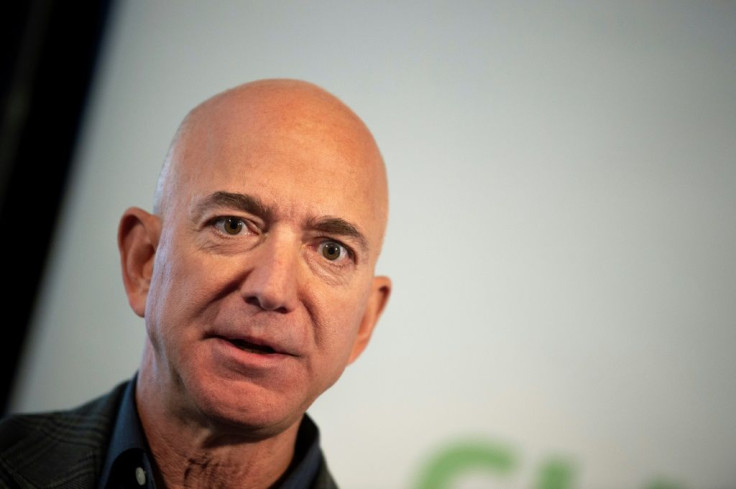Amazon’s Jeff Bezos Hit With Protests In India As Government Starts Antitrust Probe

KEY POINTS
- Bezos has pledged $1 billion to help small Indian businesses sell products online
- Indian trade associations claim 100,000 Indian traders have been forced out of business over the past four months due to Amazon, Flipkart
- India’s e-commerce market is expected to grow to $150 billion by 2022
Jeff Bezos of Amazon (AMZN) has pledged to invest $1 billion over the next five years to help millions of small businesses in India sell their products online around the globe. Amazon said it hopes to export $10 billion worth of Indian goods around the world by 2025 .
“We’re going to use our global footprint to export outside of India,” Bezos said at an event in New Delhi on Wednesday.
Wearing traditional Indian attire, Bezos declared: “I predict that the 21st century is going to be the Indian century. The dynamism, the energy, this country has something special. The most important alliance is going to be the alliance between India and the United States, the world’s oldest democracy and the world’s largest democracy.”
Bezos reportedly has sought a meeting with Prime Minister Narendra Modi and will later visit Mumbai to hobnob with Bollywood stars.
Amazon has already spent at least $5 billion in India as the nascent ecommerce industry has gained a strong foothold. Last September Amazon opened a massive office complex in the southern city of Hyderabad.
However, Amazon’s aggressive expansion in India has outraged millions of small retail business owners who allege that the giant online retailer has harmed their livelihoods by heavily discounting their products.
Amazon has also been accused of violating India’s foreign investment laws which stipulate that foreign e-commerce can only sell items listed and offered by local independent sellers – rather than selling directly to customers. Indian retailers further allege that companies like Amazon and Flipkart -- owned by Walmart (WMT) -- skirt these laws by owning majority interests in third-party entities and then selling their own products through these vehicles.
Outside of the New Delhi venue where Bezos spoke, a protest organized by the Confederation of All India Traders, or CAIT, which represents more than 70 million small businessmen and 40,000 trade associations in India, staged a loud protest condemning Bezos. Protesters held up signs calling on Bezos and Amazon to leave India.
“The goal of Amazon and Flipkart is to bring in crony capitalism in India, dominate and monopolize the market, wipe out the competition, and leave consumers with no choice,” said Praveen Khandelwal, CAIT’s secretary general.
Khandelwal alleged that more than 100,000 small retailers in India had already been driven out of business over the past four months alone due to Amazon’s and Flipkart’s deep discounting. More than half of those shuttered businesses were mobile phone sellers victimized by online price cutting by phone manufacturers allied with Amazon and Flipkart.
In a letter sent to Modi last week, Khandelwal alleged that Amazon was an “economic terrorist” that engages in predatory pricing, deprives the government of tax revenue and “compelled the closure of thousands of small traders.”
On Monday, India’s antitrust regulator, the Competition Commission of India, started a probe to determine if Amazon and Flipkart has indeed violated its competition laws by offering deep discounts and promoting “preferred sellers” on their platforms.
Amazon said it will cooperate with the investigation but assured that it was "confident" it operates legally in India.
“For the first time, these companies have come under the regulatory spotlight in India,” Khandelwal said.
Sumit Agarwal, national secretary of CAIT, said: "We are not against e-commerce. We just want the commission and the government to set up a fair and equitable playing field where the Amazons and Flipkarts cannot abuse the system with unfair subsidies and their favored traders."
The antitrust commission is expected to finish its investigation within 60 days. It has the power to impose significant penalties on companies deemed to have violated its laws.
Amazon and Flipkart have other worries as well – they are dreading the entrance of JioMart, a new online retail business from billionaire Mukesh Ambani of conglomerate Reliance Industries.
“Reliance does not have constraints which are there for foreign retailers,” said Arvind Singhal, chief executive at retail consultancy Technopak. “That is a potent threat and a strong competitor to both Flipkart and Amazon.”
For now, Amazon and Flipkart dominate India's $39 billion online retail market.
Driven by a tremendous growth in mobile phone subscribers and cheap data, India’s e-commerce industry is projected to grow to $150 billion by 2022.
© Copyright IBTimes 2024. All rights reserved.





















